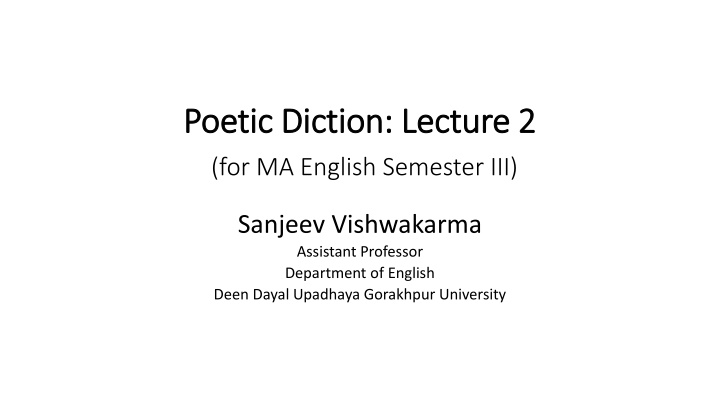
Poetic Diction: Insights from Literary Masters
Explore the essence of poetic diction through the perspectives of renowned literary figures such as Addison, Pope, Gray, and more. Delve into the significance of language in poetry, its evolution over time, and the contrasting views on poetic diction. Gain a deeper understanding of how language choices impact the beauty and expression of poetry.
Download Presentation

Please find below an Image/Link to download the presentation.
The content on the website is provided AS IS for your information and personal use only. It may not be sold, licensed, or shared on other websites without obtaining consent from the author. If you encounter any issues during the download, it is possible that the publisher has removed the file from their server.
You are allowed to download the files provided on this website for personal or commercial use, subject to the condition that they are used lawfully. All files are the property of their respective owners.
The content on the website is provided AS IS for your information and personal use only. It may not be sold, licensed, or shared on other websites without obtaining consent from the author.
E N D
Presentation Transcript
Poetic Diction: Lecture 2 Poetic Diction: Lecture 2 (for MA English Semester III) Sanjeev Vishwakarma Assistant Professor Department of English Deen Dayal Upadhaya Gorakhpur University
Poetic Diction Addison says about poetic diction: Since it often happens that the most obvious Phrases, and those which are used in ordinary Conversation, become too familiar to the Ear, and contract a kind of Meanness by passing through the Mouths of the Vulgar, a Poet should take particular Care to guard himself against Idiomatick Ways of Speaking. --Spectator No. 285
Poetic Diction And Pope is of view: It must also be allowed that there is a majesty and harmony in the Greek language, which greatly contribute to elevate and support the narration. But I must also observe, that this is an advantage grown upon the language since Homer's time: for things are removed from vulgarity by being out of use; and if the words we could find in any present language were equally sonorous [pleasant] or musical in themselves, they would still appear less poetical and uncommon than those of a dead one, from this only circumstance, of being in every man's mouth.
Poetic Diction The following positive defense of a special poetic diction is provided by Thomas Gray: The language of the age is never the language of poetry; except among the French, whose verse, where the thought and image does not support it, differs in nothing from prose. Our poetry, on the contrary, has a language peculiar to itself, to which almost everyone that has written has added something by enriching it with foreign idioms and derivations: nay, sometines words of their own composition or invention. Shakespeare and Milton have been great creators this way; and no one more licentious than Pope or Dryden, who perpetually borrow expressions from the former.
Poetic Diction In his Preface to the Iliad, 1715, Pope wrote: "We acknowledge him [Homer] the A father of poetical diction." As with so many other classic themes, Samuel Johnson wrote: There was before the time of Dryden no poetical diction. ... Those happy combinations of words which distinguished poetry from prose had been rarely attempted; we had few elegancies or flowers of speech.
Poetic Diction Two kinds of protest against poetic diction have occurred: that of the classicist, hostile to pedantry and affectation, appealing to polite idiom, the educated spoken word; and that of the romantic, hostile to the same things, but appealing to the primitive, the naive, the directly passionate, the natural spoken word.
